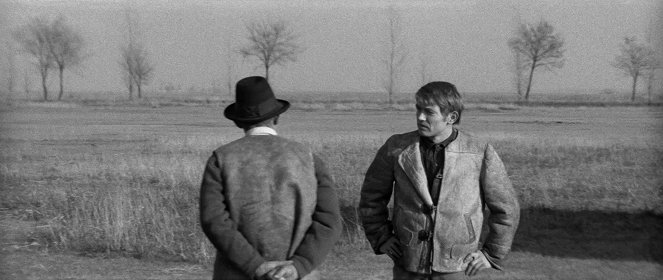Directed by:
Miklós JancsóCinematography:
János KendeCast:
Mari Törőcsik, József Madaras, Zoltán Latinovits, Andrea Drahota, András Kozák, István Bujtor, Ida Siménfalvy, János Koltai, Sándor Siménfalvy (more)Plots(1)
An elliptical, claustrophobic drama shot in the brilliant, breathtaking long takes that are Jancsó's trademark, Silence and Cry is set after the fall of the short-lived Hungarian Soviet Republic of 1919. A young Red soldier, fleeing the anti-Communist manhunt, takes refuge at the isolated farm of a peasant family, who are already under police scrutiny for being politically suspect... Working on a more intimate canvas, following the epic The Round-Up and The Red and the White (of which this film forms the final part of an unofficial trilogy) Hungarian master Jancsó's film is still very much concerned with the terrible, tyrannical impact of power, politics and history. (Second Run)
(more)Reviews (2)
I have read that the film presents a perfect unity of content and form, but in my modest opinion, it achieves it only to the extent of The Red and the White. Although Silence and Cry is more individually focused, one would expect deeper emotions towards the characters' suffering on the screen, and therefore also a deeper meaning. However, they (at least I was) will be surprised that the effect did not occur, and the spotlight is taken over by form, or rather by the perfect camera. The authors have already put the characters in front of the viewer as finished before the start of the film, they do not develop on the screen, and we are only trying to determine the exact relationship between them and their motivation - which, however, we already know in rough outlines from the beginning (or which the viewer cannot even assume, as later he is faced with a finished matter/resolution, but that does not have much importance in the story/message of the film - I mean the final scandal with the drinks) and they do not hide the substance for our connection with them, especially when their personal histories are overshadowed by the general anxiety of the capricious Horthy power. The camera is a different thing. Jancsó's detachment from the necessity of editing towards greater and greater fluidity of shots was chronologically evident in each of his (subsequent) films, and here the editing is already only a necessary (temporal and spatial) intermediary between two situations/scenes, after the introduction of which the whole scene can do without any editing.
()
Truth prevails because the winner determines what becomes truth. Those who lose can adapt, leave into exile, or die. And sometimes they have no choice because they are mere objects of the victors' will. Miklós Jancsó made a perfectly minimalist film about one bitter chapter of Hungarian history in the 20th century. The film will be appreciated by a club audience open to psychological studies of human characters, as there is no action to be found and the director was definitely not aiming for superficial pleasing effects, but rather for an artistic statement about the time and characters. It is a psychological study of people under pressure, who are unwilling to give up their ideals and instead choose the path of futile personal rebellion. An atmospheric, but truly intimate matter. Overall impression: 75%.
()


Ads